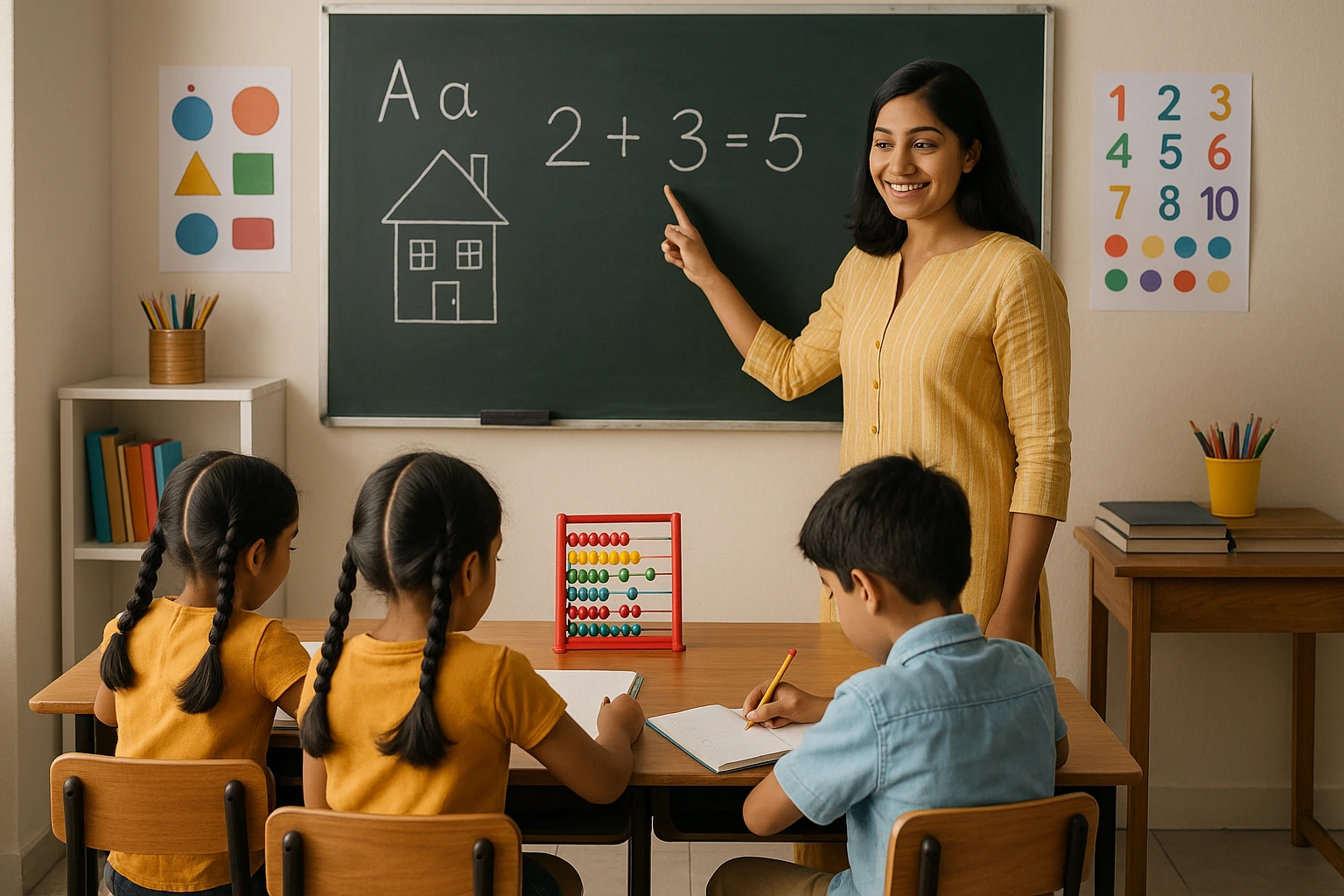
What is a Remedial Class? It is a class of additional support provided to struggling students to help them keep pace with regular classroom instruction. It is designed to assist students in excelling in specific areas, such as mathematics, reading, or writing. By filling their knowledge gaps, students become confident and start catching up with other students. What is a Remedial Class can be best explained as a focused approach to offer individualized instruction to make sure that no child is left behind in school.
What is the Purpose of a Remedial Class?
Remedial Classes are offered as a chance for students who are finding it hard to attain the learning outcomes at their grade level. Remedial classes are designed to cater to academic gaps and reinforce foundational ideas.
To download the brochure of the SEN Course, Click Here!
For more details on the SEN Course, Call/WhatsApp at +919321024137 / +919869866277
Key purposes of remedial classes include:
Building Core Skills
What is a Remedial Class? start from scratch, which means the basic concepts are taught to children, and efforts are taken to make sure children understand these concepts thoroughly so that they can understand complex topics with ease.
Academic Progress
With targeted help, students gradually perform better in regular classroom activities and assessments.
Making the child self-confident
Individualised attention provided to the child helps them understand topics better, which enables them to achieve their learning goals. This helps to boost their confidence, making them feel self-reliant.
Fosters Independent Functioning.
With better learning outcomes and a thorough understanding of basic concepts, children gain expertise, helping them manage their challenges independently.
Increasing the enrolment rates
With constant guidance and support, there is a positive reaction among children and parents to be enrolled in school, reducing the dropout rates.
Remedial classes help children master the core skills and concepts properly, which helps to enhance their learning journeys, making them strive harder for better results.
To download the brochure of the SEN Course, Click Here!
For more details on the SEN Course, Call/WhatsApp at +919321024137 / +919869866277

Source: istockphoto
How to Identify Students Requiring Remedial Classes?
It may be difficult to decide which students would prosper in remedial classes, but it is extremely necessary to observe and assess students for various things. Children with Special Needs and Slow learners have certain attributes that help educators understand that there might be underlying causes for the child’s struggles. Early identification of these signs helps to lay down a systematic intervention approach that helps students get the desired academic and emotional support for thriving successfully in a mainstream classroom.
Some noticeable indications that suggest that the student needs remedial classes are listed below:
Consistent dipping grades
When the student shows poor grades consistently over a period of time, it can be a sign that the child might need academic aid for better comprehension of basic concepts.
Poor display of basic skills
Despite constant efforts and trying, the child fails to master basic learning skills of reading fluently, understanding time, maths concepts, or appears highly disorganised could hint at the need for remedial classes.
Poor engagement in the classroom.
Children who hesitate to participate in any classroom activities and prefer sitting quietly, avoiding eye contact, might be suffocating inside to ask for help.
Slow Learning Pace
When most of the students have finished their work, but some are still not understanding basic instructions to start can be a signal for remediation.
Frequent Absenteeism
Missing classes can cause students to fall behind and require help to catch up.
Poor Retention
Inability to remember or apply previously taught lessons, even after revision, is a key indicator.
Teacher Observations
Educators often notice patterns of difficulty during routine interactions or assignments.
Teachers and parents working together can ensure that children who need remedial classes receive the right interventions at the right time, supporting steady academic growth.
To download the brochure of the SEN Course, Click Here!
For more details on the SEN Course, Call/WhatsApp at +919321024137 / +919869866277

How to Plan and Implement Remedial Classes?
Planning and implementing remedial classes requires a systematic approach to carefully address the specific learning needs of students. Bridging the current academic gaps and building a strong foundation for basic skills is the main goal of Remedial Classes.
Here are the key steps to plan and implement remedial classes effectively:
- Recognising learning gaps: Ascertain the learning gaps by conducting tests, assignments, and informal evaluations to understand the areas of concern.
- Set Clear Goals: Set realistic long-term and short-term learning objectives depending upon each child’s strengths and competencies.
- Design a customised plan.: Based on the child’s strengths, design tailored lesson plans that strengthen the child’s basic understanding of concepts and literacy skills.
- Incorporate multi-sensorial techniques: Children with special needs are inclined towards sensorial learning. So, incorporate activities to make lessons more engaging and to retain information better.
- Keep the group size small.: Maintain Small Group Sizes to ensure that every child gets better attention, enabling them to solve queries and doubts.
- Supervise the progress: Supervise the progress regularly by conducting simple assessments or organising quizzes to measure improvements and adapt teaching strategies.
- Work with parents: Collaborate with Parents to educate them about teaching strategies that support their learning at home as well.
With consistent effort and strategic planning, remedial classes can significantly help students overcome academic challenges and perform better in the mainstream classroom.
Best Practices for Conducting Remedial Classes
Effectively running remedial classes requires an intense effort that is appropriate to the individual’s pace and understanding of every student. Teachers ought to come up with an atmosphere in which students are not criticized but encouraged and assisted in order to improve their performance. Implementing best practices can guarantee that remedial sessions result in substantial improvements.
Here are some best practices for conducting What is a Remedial Class?:
Identification
To help a child, the most important step is to identify the areas of concern by conducting informal tests, followed by formal testing to ascertain the problem areas.
Master the art of curating an ideal.
Be thorough with your child’s data, especially their strengths and weaknesses, which will help you devise appropriate IEPS and set realistic goals.
Simple and Concise Instructions
Use simple language with the child that is not confusing, and try to compartmentalise the instructions for students to manage them easily.
Using innovative practices
Implementing engaging practices that help children be completely involved in the activities, ensuring retention of the topics for a longer period.
Regular feedback
The child’s progress must be tracked regularly, and proper records to be maintained that must be shown to the parents with proper constructive feedback.
Conducive learning atmosphere
Design a learning space that helps children feel safe, ensuring children can express themselves freely without any fear of being judged or mocked.
Track and Share Progress
Maintain records of the student’s progress and maintain periodic communication with the parents for reporting the progress.
Foster Cooperative learning
Promote peer support by pairing children with understanding classmates to work together in some learning activities.
Incorporating these tested strategies for remedial classes helps students handle their academic challenges effectively and gain academic excellence.

Benefits of Remedial Classes for Students & Teachers
Remedial classes are an essential concept that benefits not just children with special needs or slow learners but also helps all children revisit the old topics and master them. They help children attain basic competencies in the skills of reading, writing, and maths. The classes are a way to build or develop learning in areas where it has been lost to address some of the gaps and catch up to other students. Positive attention and a simple method of instruction give confidence to students and enable them to do better in their own classrooms.
Some benefits are:
- Focused Learning Support: Classes are focused entirely on each student’s level and learning needs.
- Improved Skills: Repetitive practice helps students gain a better understanding of their essential subjects.
- Improved confidence: Personal growth will add to an individual’s self-esteem and lessen self-doubt.
- Enhanced Class Engagement: As students succeed, they will then become involved members of the class.
- Lowered Stress: Support and friendship are powerful stress relievers of academic anxiety.
Teachers who have taken the Special Education Needs Course are particularly adept at running successful remediation sessions. They can identify difficulties, adjust teaching, and provide encouragement.
Vidhyanidhi Education Society (Govt. Regd.) offers a well-structured Special Education Needs Course that equips teachers to assist learners facing academic delays. This training enhances their ability to make remedial teaching effective and meaningful.
With guidance from professionals trained in the Special Education Needs Course, remedial classes become a valuable tool for helping students succeed.
Elevate your teaching skills with Vidhyanidhi Education Society’s SEN Course today!
To download the brochure of the SEN Course, Click Here!
For more details on the SEN Course, Call/WhatsApp at +919321024137 / +919869866277
FAQs
Who are remedial students?
Remedial students are students who require additional assistance to understand basic academic concepts and to stay at a grade level in something like math or reading.
How long does a remedial lesson last?
The length of remedial lessons is very subjective to the needs of learning and to the individual progress of the student; it might last a few weeks or a few months.
What is done in a remedial class?
In a remedial class, students revisit basic concepts through focused, unadorned lessons and drills by professional trainers like Vidhyanidhi Education Society.



